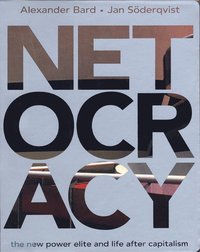
- Format
- Häftad (Paperback)
- Språk
- Engelska
- Antal sidor
- 288
- Utgivningsdatum
- 2002-05-01
- Upplaga
- 1
- Förlag
- Reuters
- Medarbetare
- Soderqvist, Jan
- Illustrationer
- Ill.
- Dimensioner
- 220 x 175 x 22 mm
- Vikt
- Antal komponenter
- 1
- ISBN
- 9781903684290
- 580 g
Kundrecensioner
Fler böcker av Alexander Bard
-
Process och Event
Alexander Bard, Jan Söderqvist
-
Digital Libido : sex, power and violence in the network society
Alexander Bard, Jan Söderqvist
-
The Netocrats
Alexander Bard, Jan Söderqvist
-
Process and Event
Jan Söderqvist, Alexander Bard
Recensioner i media
"Read it for the reason business information company Reuters published it: to understand why power in your workplace and your world isn't where you thought."New Scientist
"Contains interesting insights (into the growing likelihood of populist violence among the displaced and dispossessed.)" New Statesman
"An extraordinary book." Computer Weekly
"Digging deeper and wider than any previous effort into what the information revolution truly means, Netocracy is the must-read for anybody even remotely interested in what those kids out there are actually doing to us all with their gadgets. It's a bigger, more dramatic and very different change from what we had expected. Netocracy is the unsurpassable how and when of this whole revolution." Kjell A. Nordstrm and Jonas Ridderstrale, authors of Funky Business talent makes capital dance.
"He's seen the future. A renaissance man of many talents, Bard is either a genius or a madman. You decide" The Times Magazine, July 2003
"Alexander Bard, author of 80 hit singles in Scandinavia, is a record producer, Internet mogul, philosophy enthusiast, and much more." FTDynamo, Euro-Gurus
"Netocracy is a fresh take on the information revolution. Bard and Soderqvist's concepts are clear and meticulously explained...the book is a brave account of the challenges ahead." Mail & Guardian Online (South Africa)
Övrig information
Alexander Bard is a lecturer at SpeakersNet, with clients including Ericsson and the Stockholm School of Economics. He is also a writer,sociologist, philosopher and TV talk show host. An internationally renowned record producer, artist and songwriter, he is a co-founder of Scandinavia's largest independent record company, Stockholm Records. Alexander is one of the true Internet pioneers; he co-founded a number of successful e-commerce ventures, including the widely celebrated interesting.org, and runs nine international networks. Jan SOderqvist is a writer, editor, TV producer and lecturer at SpeakersNet. He is the film critic at the Swedish daily Svenska Dagbladet and a political columnist. After studying film in Los Angeles in the early 1980s Jan earned a BA in literature and worked in every media area imaginable. He has edited a number of prestigious magazines, and as a writer has covered everything from men's fashions and cooking trends to the Asian crisis and the revolution in info-technology.
Innehållsförteckning
1. Technology: the motor of historical motion
2. Three Paradigms: feudalism - capitalism - informationalism
3. The Plurarchic Society: the end of the nation state and the crisis of democracy
4. In search of attention: information - propaganda - entertainment
5. The Netocrats and their worldview
6. Globalization: financial and cultural
7. The new biology and the ethics of the Netocracy
8. The death of man and the birth of the virtual subject
9. The network pyramids: the power hierachies of attentionalism
10. Sex and the new tribalism, virtual education and the inequality of the brains
11. Behind the firewalls: virtual revolutionaries and the civil wars of the Netocracy
